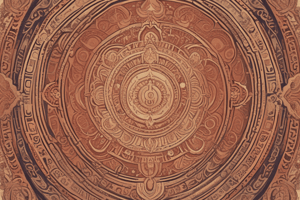Podcast
Questions and Answers
What are the foundational texts of Hinduism that are covered in this course?
What are the foundational texts of Hinduism that are covered in this course?
The Vedas, Upanishads, Bhagavad Gita, and epics like the Mahabharata and Ramayana.
What are the key philosophical concepts explored in this course?
What are the key philosophical concepts explored in this course?
Vedanta, Shaivism, Vaishnavism, and Shaktism.
What are some of the Hindu rituals and practices examined in this course?
What are some of the Hindu rituals and practices examined in this course?
Hindu rituals, festivals, and daily practices.
How does this course approach the study of Hinduism in a modern context?
How does this course approach the study of Hinduism in a modern context?
What skill does this course aim to enhance in students?
What skill does this course aim to enhance in students?
What is the overall objective of this course?
What is the overall objective of this course?
What is the name of the eternal tradition in Hinduism?
What is the name of the eternal tradition in Hinduism?
What is the time period of the Indus Valley Civilization?
What is the time period of the Indus Valley Civilization?
What are the four key concepts in Hinduism?
What are the four key concepts in Hinduism?
What are the two epics studied in Hindu Scriptures?
What are the two epics studied in Hindu Scriptures?
What is the focus of the capstone project in the course?
What is the focus of the capstone project in the course?
What are the three components of the focused study in the capstone project?
What are the three components of the focused study in the capstone project?
Flashcards are hidden until you start studying
Study Notes
Course Overview
- The course provides an in-depth exploration of Hinduism, one of the world's oldest and most complex religious traditions.
- It covers foundational texts, key philosophical concepts, rituals, practices, diversity of deities and sects, historical development, and contemporary issues.
Course Objectives
- Understand foundational texts and teachings of Hinduism in their historical context.
- Explore diverse philosophies and sects within Hinduism, including Vedanta, Shaivism, Vaishnavism, and Shaktism.
- Study Hindu rituals, festivals, and daily practices, understanding their significance and variations.
- Analyze the role and adaptation of Hinduism in the contemporary world, including its interaction with modernity and global issues.
- Develop comparative and critical thinking skills to critically analyze religious texts and practices and compare Hinduism with other religious traditions.
Course Outline
Module 1: Introduction to Hinduism
- Overview of Hinduism's origins and development.
- Key concepts: Dharma, Karma, Moksha, Reincarnation.
Module 2: Hindu Scriptures
- Study of the Vedas, Upanishads, and Bhagavad Gita.
- Exploration of epics: Mahabharata and Ramayana.
Module 3: Hindu Philosophies and Theology
- Understanding different Hindu philosophical systems.
- Overview of major deities and their worship.
Module 4: Rituals, Festivals, and Daily Practices
- Hindu rituals and sacraments (samskaras).
- Major Hindu festivals and their meanings.
Module 5: Hindu Sects and Movements
- Diversity within Hinduism: Shaivism, Vaishnavism, Shaktism.
- Modern Hindu movements and teachers.
Module 6: Hinduism in Contemporary Society
- Hinduism and contemporary issues.
- The global spread of Hinduism and interfaith relations.
Capstone Project
- Comparative analysis of a Hindu concept, practice, or text.
- Components: focused study, comparative perspective, contextual analysis, and presentation.
Introduction to Hinduism
- Hinduism, also known as Sanātana Dharma or the eternal tradition, is one of the oldest religions in the world.
- Hinduism is a complex, pluralistic tradition with a rich tapestry of philosophical, cultural, and spiritual elements.
- The Indus Valley Civilization (3300–1300 BCE) is often cited as a precursor to Hindu practices.
Studying That Suits You
Use AI to generate personalized quizzes and flashcards to suit your learning preferences.




